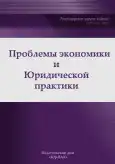On Possible Areas of Use of Artificial Intelligence as a Legal Assistant: Pros and Cons
- Authors: Berova J.M.1
-
Affiliations:
- North-Caucasian Advanced Training Institute (branch) of the Krasnodar University of the Ministry of Internal Affairs of Russia
- Issue: Vol 18, No 1 (2022)
- Pages: 94-97
- Section: Articles
- URL: https://journals.eco-vector.com/2541-8025/article/view/532060
- ID: 532060
Cite item
Abstract
Artificial intelligence technologies are among the most discussed at present. Their implementation demonstrates significant results and creates new challenges and threats. In this context, the particular relevance of the study of artificial intelligence and the possibilities of its use in the field of jurisprudence should be noted, since this area of the life of society and the state is characterized by the multidimensionality and scale of the ongoing processes, which are associated with the presence of a large number of routine actions. The purpose of the present study is a comprehensive analysis of the possibilities of using artificial intelligence as a legal assistant. Artificial intelligence should now be perceived as an integral part of improving the life of society and the state, however, the implementation and use of the above technologies seems to be very ambiguous. The authors come to the conclusion that the introduction and active use of artificial intelligence in jurisprudence has a number of advantages and disadvantages. On the one hand, this improvement in legal assistance creates qualitatively new opportunities for the implementation of significant law-making and law enforcement processes, on the other hand, very specific challenges and threats to private and public interests arise as part of the use of the above technologies. The fundamental importance of timely legal regulation of the introduction of artificial intelligence and its dynamic technological improvement is noted.
Full Text
About the authors
Juliet M. Berova
North-Caucasian Advanced Training Institute (branch) of the Krasnodar University of the Ministry of Internal Affairs of Russia
Email: lel4993@mail.ru
Dr. Sci. (Law), Assoc. Prof., Police Colonel, Deputy Chief for academic work Nalchik, Russian Federation
References
- Altukhov A.V., Kashkin S.Yu. Legal nature of digital platforms in Russian and foreign doctrine // Actual problems of Russian law. 2021. Vol. 16. No. 7 (128). pp. 86-94.
- Dremlyuga R.I., Korobeev A.I. The use of artificial intelligence for the collection and analysis of evidence // Legal Bulletin of the Kuban State University. 2021. No. 4. P. 55-63.
- Ismailov I.Sh. Artificial intelligence: legal status, problems of definition and prospects for use in jurisprudence // Problems of Economics and Legal Practice. 2019. No. 5. P. 135-139.
- Lyubimov A.P., Ponomareva D.V., Barabashev A.G. Basic concepts of artificial intelligence: monograph. M., 2019. 116 p.
- Molodtsov T.R. Artificial intelligence as a way to optimize the rule-making process // Gaps in Russian legislation. 2019. No. 3. P. 12-15.
- Papysheva E.S. On the possibilities of integrating artificial intelligence into the criminal process // Problems of Economics and Legal Practice. 2021. No. 5. P. 220-227.
- Silchenko R.N. Problems of protecting human rights and freedoms in the context of the use of artificial intelligence technologies // Problems of Economics and Legal Practice. 2019. No. 4. P. 76-82.
- Decree of the President of the Russian Federation of October 10, 2019 No. 490 «On the development of artificial intelligence in the Russian Federation» (together with the «National strategy for the development of artificial intelligence for the period until 2030») // Collected Legislation of the Russian Federation. 2019. No. 41. Art. 5700.
Supplementary files











